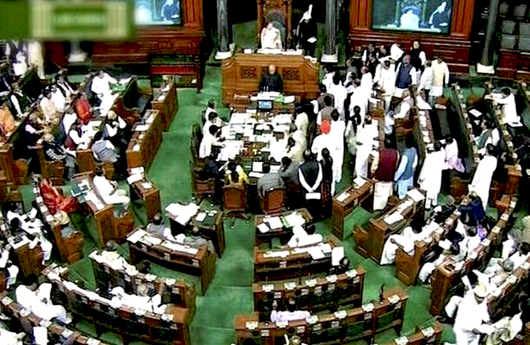New Delhi, Mar 17: The Lok Sabha witnessed noisy scenes during Zero Hour on Tuesday when the Congress and the AIADMK raised the issue of desecration of a church in Hisar, the rape of a nun in West Bengal and a communally objectionable statement made by senior BJP leader Subramanian Swamy in Assam.
Raising the issue, Congress MP Gaurav Gogoi said, “I want to draw the attention of my colleagues to the growing fear among people and rising incidents of religious intolerance. A church was desecrated in Hisar in Haryana, and the state government said legal papers were not available. Can that be a reason (for destroying a church)?”

Mr. Gogoi also pointed out that a national executive member from the BJP had visited Assam and made objectionable statements. “Does God only reside in temples, not in mosques and churches,” he asked.
He was referring to a statement made by senior BJP leader Subramanian Swamy in Assam: he reportedly said mosques and churches are mere “buildings” to offer prayers, and therefore there was “no problem in demolishing them.”
The AIADMK’s P.B. Venugopal, echoing Mr. Gogoi on the issue, said, “India is a secular country and all politicians must avoid glorifying any one religion.”
Immediately, after that, as chaos continued in the Lok Sabha, the Congress’ Adhir Ranjan Choudhury and the CPI(M)’s Mohammad Salim raised the issue of the rape of a nun in West Bengal’s Ranaghat district. Mr. Salim stressed that communal incidents was not confined to one state or one religion, hitting out at the BJP, the ruling party, accusing it of “creating a communal situation in the country.”
Immediately, the BJP’s S.S. Ahluwalia who represents West Bengal’s Darjeeling constituency, jumped to his feet at this point and addressed the house in Bengali, attacked the Trinamool Congress government in the state. This saw the Trinamool’s Saugata Roy joining issue with Mr. Ahluwalia, stressing that Chief Minister Mamata Bannerjee had visited the traumatised nun in Ranaghat and promised stern action against the culprits.
Union Parliamentary Affairs Minister M. Venkaiah Naidu, then rose to his feet to support the Trinamool Congress, but went on to dissociate his government from the communal episodes in Haryana and West Bengal, and his party from Dr. Swamy’s statement in Assam.
Having done that, Mr. Naidu went on to attack the opposition, accusing them of playing vote bank politics. Later, as agitated MPs continued to highlight the issue, he delivered his final lines: “This government under the leadership of Narendra Modi believes in justice for all, appeasement of none. This government is perfect.”
Rajya Sabha uproar too
There was uproar in the Rajya Sabha over comments by Mr. Swamy in Assam where he reportedly said mosques are not religious places.
“Secularism is the biggest strength of a democracy. If there is no secular character, there will be no democracy,” Congress leader Pramod Tiwari said, raising the issue soon after the house met.
“They are talking about breaking mosques,” Mr. Tiwari said as several opposition members joined him and created uproar.
The members remained unrelenting even as Minister of State for Parliamentary Affairs Mukhtar Abbas Naqvi said the members could discuss the issue.
Amid the commotion, the house was adjourned for ten minutes. According to reports, Mr. Swamy, at a function in Guwahati, said mosques are not religious places but just buildings, and it can be demolished any time.
He also cited the example of mosques demolished for construction of roads in Saudi Arabia.






Comments
Add new comment